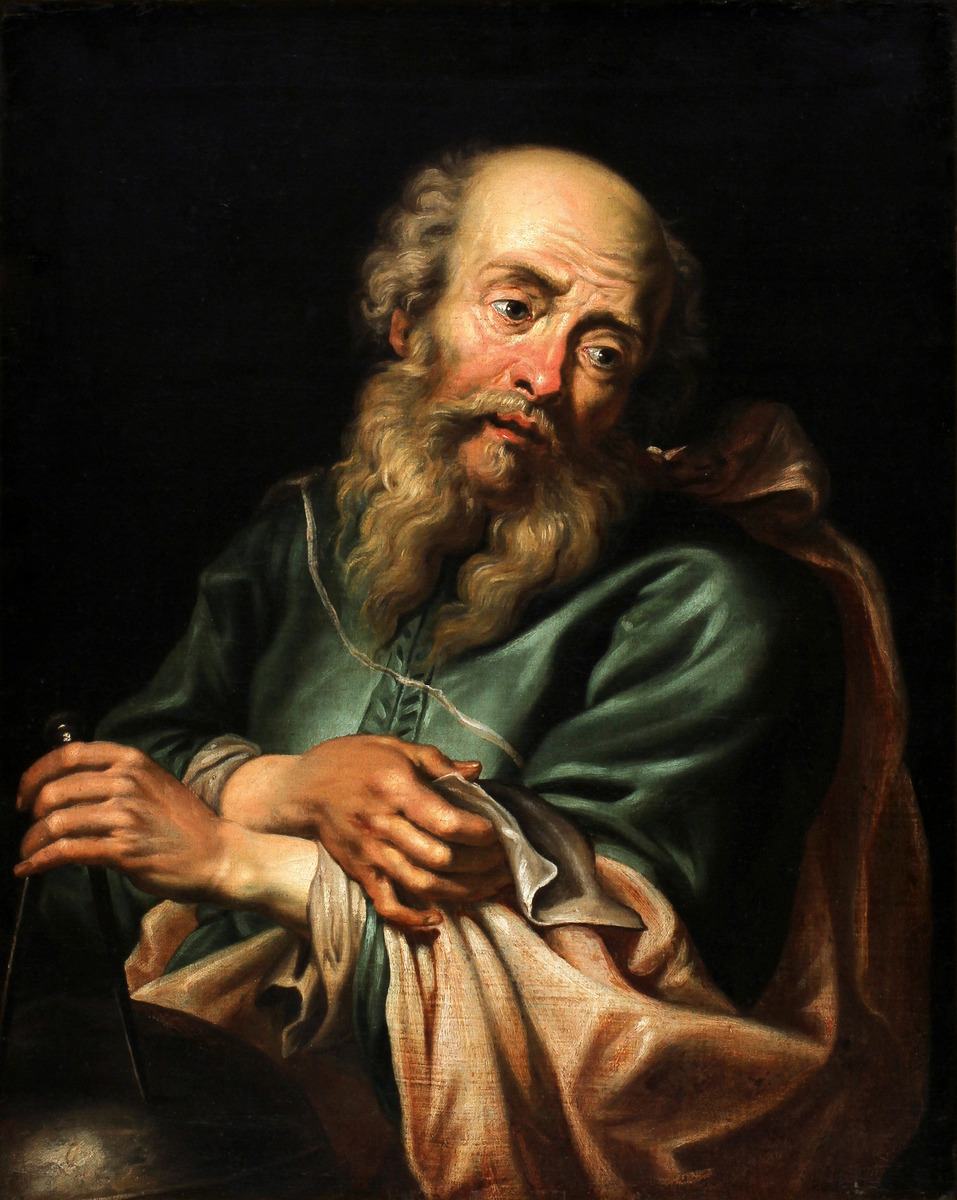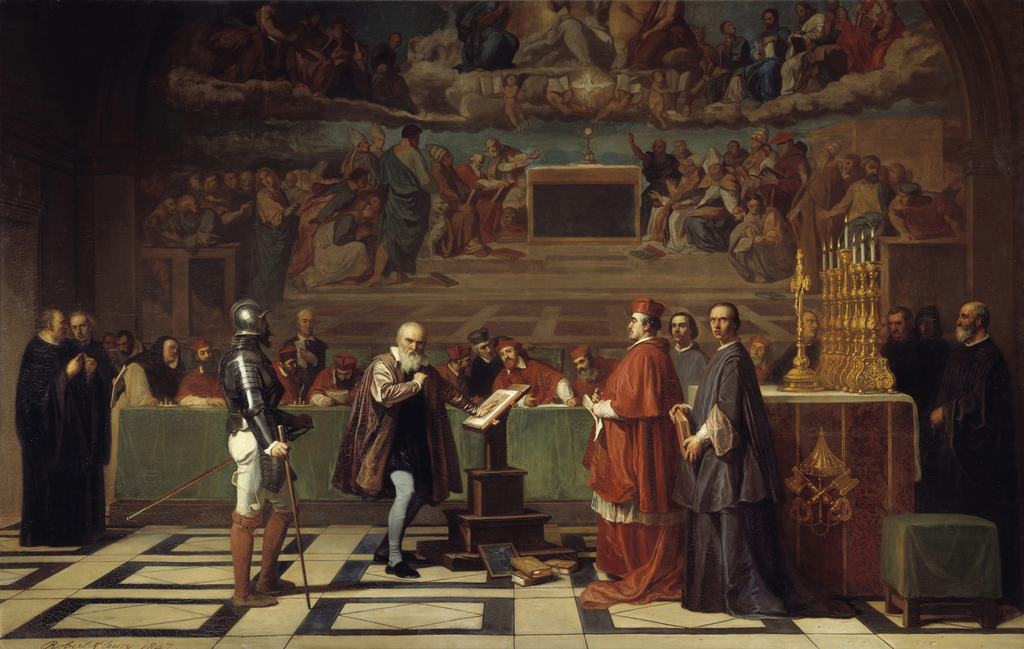Galileo Galilei
Galileo Galilei (15 February 1564 – 8 January 1642), commonly referred to as Galileo, was an Italian astronomer, physicist and engineer, sometimes described as a polymath, from the city of Pisa, then part of the Duchy of Florence. Galileo has been called the "father" of observational astronomy, modern physics, the scientific method, and modern science.
Galileo invented the thermoscope and various military compasses, and used the telescope for scientific observations of celestial objects. His contributions to observational astronomy include telescopic confirmation of the phases of Venus, observation of the four largest satellites of Jupiter, observation of Saturn's rings, and analysis of lunar craters and sunspots.
Galileo's championing of Copernican heliocentrism (Earth rotating daily and revolving around the sun) was met with opposition from within the Catholic Church and from some astronomers. The matter was investigated by the Roman Inquisition in 1615, which concluded that heliocentrism was foolish, absurd, and heretical since it contradicted Holy Scripture.
Controversy over heliocentrism
At the time of Galileo's conflict with the Church, the majority of educated people subscribed to the Aristotelian geocentric view that the Earth is the center of the Universe and the orbit of all heavenly bodies, or Tycho Brahe's new system blending geocentrism with heliocentrism. Opposition to heliocentrism and Galileo's writings on it combined religious and scientific objections. Religious opposition to heliocentrism arose from biblical passages implying the fixed nature of the Earth.
Scientific opposition came from Brahe, who argued that if heliocentrism were true, an annual stellar parallax should be observed, though none was at the time. Aristarchus and Copernicus had correctly postulated that parallax was negligible because the stars were so distant. However, Tycho countered that since stars appear to have measurable angular size, if the stars were that distant and their apparent size is due to their physical size, they would be far larger than the Sun. In fact, it is not possible to observe the physical size of distant stars without modern telescopes.
Galileo defended heliocentrism based on his astronomical observations of 1609. In December 1613, the Grand Duchess Christina of Florence confronted one of Galileo's friends and followers, Benedetto Castelli, with biblical objections to the motion of the Earth. Prompted by this incident, Galileo wrote a letter to Castelli in which he argued that heliocentrism was actually not contrary to biblical texts, and that the Bible was an authority on faith and morals, not science. This letter was not published, but circulated widely. Two years later, Galileo wrote a letter to Christina that expanded his arguments previously made in eight pages to forty pages.
Investigation by the Inquisition
By 1615, Galileo's writings on heliocentrism had been submitted to the Roman Inquisition by Father Niccolò Lorini, who claimed that Galileo and his followers were attempting to reinterpret the Bible, which was seen as a violation of the Council of Trent and looked dangerously like Protestantism. Lorini specifically cited Galileo's letter to Castelli. Galileo went to Rome to defend himself and his ideas.
At the start of 1616, Monsignor Francesco Ingoli initiated a debate with Galileo, sending him an essay disputing the Copernican system. Galileo later stated that he believed this essay to have been instrumental in the action against Copernicanism that followed. Ingoli may have been commissioned by the Inquisition to write an expert opinion on the controversy, with the essay providing the basis for the Inquisition's actions. The essay focused on eighteen physical and mathematical arguments against heliocentrism. It borrowed primarily from Tycho Brahe's arguments, notably that heliocentrism would require the stars as they appeared to be much larger than the Sun. The essay also included four theological arguments, but Ingoli suggested Galileo focus on the physical and mathematical arguments, and he did not mention Galileo's biblical ideas.
In February 1616, an Inquisitorial commission declared heliocentrism to be "foolish and absurd in philosophy, and formally heretical since it explicitly contradicts in many places the sense of Holy Scripture". The Inquisition found that the idea of the Earth's movement "receives the same judgement in philosophy and ... in regard to theological truth it is at least erroneous in faith". Pope Paul V instructed Cardinal Bellarmine to deliver this finding to Galileo, and to order him to abandon heliocentrism. On 26 February, Galileo was called to Bellarmine's residence and ordered "to abandon completely ... the opinion that the sun stands still at the center of the world and the Earth moves, and henceforth not to hold, teach, or defend it in any way whatever, either orally or in writing." The decree of the Congregation of the Index banned Copernicus's De Revolutionibus and other heliocentric works until correction.
Pope Urban VIII personally asked Galileo to give arguments for and against heliocentrism in the book, and to be careful not to advocate heliocentrism. Whether unknowingly or deliberately, Simplicio, the defender of the Aristotelian geocentric view in Dialogue Concerning the Two Chief World Systems, was often caught in his own errors and sometimes came across as a fool. Indeed, although Galileo states in the preface of his book that the character is named after a famous Aristotelian philosopher (Simplicius in Latin, "Simplicio" in Italian), the name "Simplicio" in Italian also has the connotation of "simpleton". This portrayal of Simplicio made Dialogue Concerning the Two Chief World Systems appear as an advocacy book: an attack on Aristotelian geocentrism and defence of the Copernican theory.
Trial by the Inquisition
Galileo had alienated one of his biggest and most powerful supporters, the Pope, and was called to Rome to defend his writings in September 1632. He finally arrived in February 1633 and was brought before inquisitor Vincenzo Maculani to be charged. Throughout his trial, Galileo steadfastly maintained that since 1616 he had faithfully kept his promise not to hold any of the condemned opinions, and initially he denied even defending them. However, he was eventually persuaded to admit that, contrary to his true intention, a reader of his Dialogue could well have obtained the impression that it was intended to be a defence of Copernicanism.
In view of Galileo's rather implausible denial that he had ever held Copernican ideas after 1616 or ever intended to defend them in the Dialogue, his final interrogation, in July 1633, concluded with his being threatened with torture if he did not tell the truth, but he maintained his denial despite the threat.
The sentence of the Inquisition was delivered on 22 June. It was in three essential parts:
- Galileo was found "vehemently suspect of heresy" (though he was never formally charged with heresy, relieving him of facing corporal punishment), namely of having held the opinions that the Sun lies motionless at the centre of the universe, that the Earth is not at its centre and moves, and that one may hold and defend an opinion as probable after it has been declared contrary to Holy Scripture. He was required to "abjure, curse and detest" those opinions.
- He was sentenced to formal imprisonment at the pleasure of the Inquisition. On the following day, this was commuted to house arrest, under which he remained for the rest of his life.
- His offending Dialogue was banned; and in an action not announced at the trial, publication of any of his works was forbidden, including any he might write in the future.
According to popular legend, after recanting his theory that the Earth moved around the Sun, Galileo allegedly muttered the rebellious phrase "And yet it moves".
Later life
After a period with the friendly Ascanio Piccolomini (the Archbishop of Siena), Galileo was allowed to return to his villa at Arcetri near Florence in 1634, where he spent part of his life under house arrest. Galileo was ordered to read the Seven Penitential Psalms once a week for the next three years. However, his daughter Maria Celeste relieved him of the burden after securing ecclesiastical permission to take it upon herself.
It was while Galileo was under house arrest that he dedicated his time to one of his finest works, Two New Sciences. Here he summarised work he had done some forty years earlier, on the two sciences now called kinematics and strength of materials, published in Holland to avoid the censor. This book was highly praised by Albert Einstein. As a result of this work, Galileo is often called the "father of modern physics". He went completely blind in 1638 and was suffering from a painful hernia and insomnia, so he was permitted to travel to Florence for medical advice.

